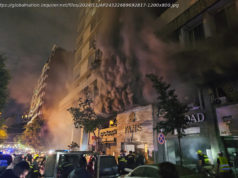Hurricane Isaac hit Louisiana in 2012. It’s also the name of a new Atlantic storm.
Hurricane season in Louisiana is usually shot through with deja vu, but at least one of the named storms making its way through the Atlantic Ocean right now has an especially familiar ring to it.
As of Monday afternoon (Sept. 10), Hurricane Isaac was a Category 1 storm in the central Atlantic Ocean, expected to make its way toward the Caribbean by Thursday. Isaac was upgraded on Sunday, making it the fifth hurricane of the 2018 Atlantic season — and one of four tropical systems forecasters were tracking Monday.
It is also — as many in the New Orleans area are keenly aware — the second hurricane to bear the name Isaac in the past decade.
For most in south Louisiana, the name Isaac brings us back to Aug. 28,2012, when a minimal, but deadly hurricane by the same name made two landfalls in the state. That Isaac, a slow-moving storm that peaked at Category 1 strength, led to 41 deaths, including 24 in Haiti, and caused an estimated $3.1 billion in damage. Floodwaters rose and swept into homes in subdivisions in LaPlace, Slidell, Madisonville and the lower West Bank. Neighborhoods across greater New Orleans spent days without electricity thanks to downed trees and power lines. It took more than a week to get electricity back in some areas.
There was also a Hurricane Isaac in 2000, though it tracked through the Atlantic Ocean and never affected land.
So, why is Isaac back as a storm name? Shouldn’t it have been retired?
The short answer is that experts didn’t think 2012’s Isaac was devastating enough to justify removing it from the rotation of future hurricane names. A better understanding of why that is starts with an explanation of how hurricanes get their names in the first place.
The National Hurricane Center started naming storms in 1953 under the guidance and oversight of the World Meteorological Organization, a specialized agency of the United Nations that coordinates with countries worldwide on assessing and understanding the Earth’s atmosphere and the weather and climate it produces.
The WMO also lays out strict rules for selecting storm names, which, in the case of Atlantic hurricanes, consists of six separate lists of male and female names used on a six-year rotation. A regional hurricane committee with representatives from more than 25 nations, including the United States, determines whether to retire certain names from the list for Atlantic Ocean storms.
Names are only retired “if a storm is so deadly or costly that the future use of its name on a different storm would be inappropriate,” according to the National Ocean and Atmospheric Administration website.
For that reason, there will never be another Hurricane Katrina, which in 2005 led to 1,836 deaths in the U. S., mostly in Louisiana, caused levee failures and catastrophic flooding in New Orleans, and, at $125 billion in total damage, is one of the costliest storms in history.
Dennis Feltgen, a spokesman for the National Hurricane Center, said in an email that the WMO’s Region IV Hurricane Committee, the group that makes decisions on Atlantic hurricane names, met in spring 2013 to consider a range of meteorological issues, including the fate of the Isaac name. The committee included experts from more than 20 nations in the Caribbean and Latin America as well as the U. S., U. K., France and the Netherlands.
The experts determined 2012’s Isaac “was not a catastrophic storm, thus not meeting part of the criteria to retire the name,” Feltgen wrote.
Several storm names from the hyperactive 2017 hurricane season are among those that have since been retired. Those include:
See the National Hurricane Center’s full list of retired hurricane names.






